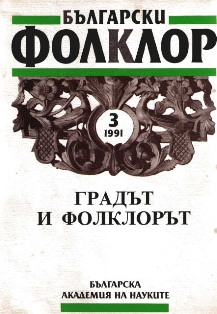Събитие и ритуал (Студентските стачки като катализатор на културен синтез)
Events and Rites (Students’ Strikes as Catalysis of the Cultural Synthesis)
Author(s): Iveta Todorova-PirgovaSubject(s): Anthropology
Published by: Институт за етнология и фолклористика с Етнографски музей при БАН
Summary/Abstract: The article states the problem of the dependence existing between the mode of establishing and functioning of certain cultural sub-structures and the social activity of relevant social groups, and the forms of materialization of these dependences. The author analyses a type of students’ manifestations – the parody processions which took place during the two biggest students’ strikes in Sofia in 1990, as well as some occasional events illustrating the mechanism of folklore communication and creativity. In the beginning of the article the author points out that such type of performances are generated in a specific type of quasi-isolated group and are a mark of their social and cultural autoidentification. The article develops the hypothesis of restricting a group to a unique idea and the process bringing its members to realize the necessity of cultural performance, of cultural interpretation of some types of social and political actions, as well as the creation of folklore texts and folklore performances, especially in the cases when the group is conscious of its isolation. The generation of these texts and their functioning as markers of the general idea leading the group, and their role for the personal motivation of the group members, transforming their commitment to the group into a prestigious social, political and aesthetical realisation, is studied in the context of the socio-psychological features of the performer (personality or group), as well as in the context of the particular situation on which focuses the cultural code images of some type of activities. The summaries of two parody processions (“Military parade and demonstration” and “Funeral of the Success”) and their analysis as parody texts contributes to the specification of the components of the context, of the “second plan”, the understanding of which makes possible to decode the sense of every detail of the studied events. Further, the events are studied with regards to their cultural determination, and the ritual/unique opposition in each of them, profiling the arguments permitting to identify them as forms of a cultural synthesis.
Journal: Български фолклор
- Issue Year: XVII/1991
- Issue No: 3
- Page Range: 41-54
- Page Count: 14
- Language: Bulgarian
- Content File-PDF

